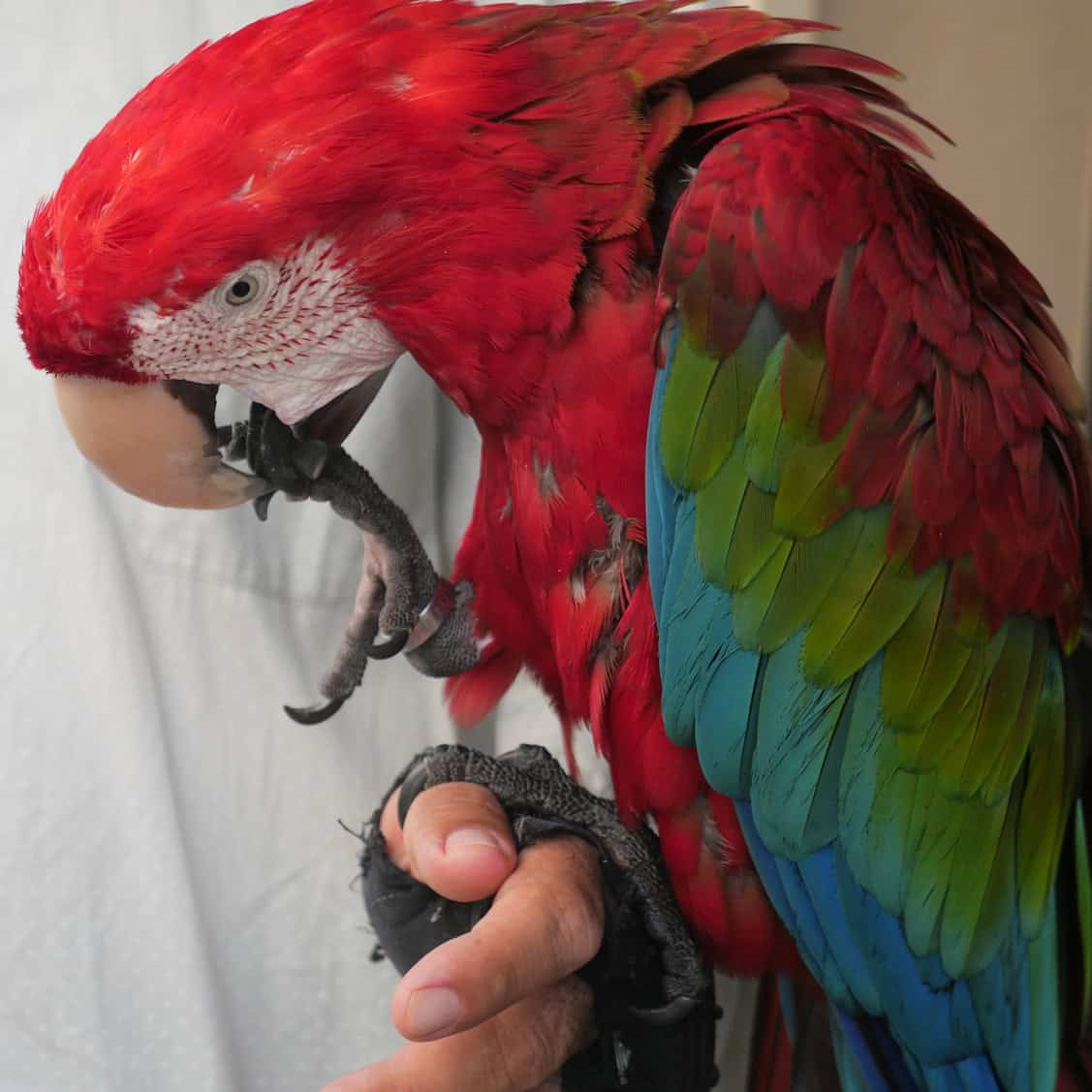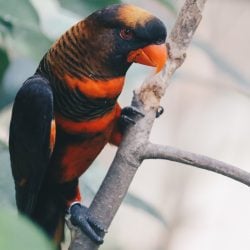
Caring for an Arthritic Parrot: A Guide to a Happy and Healthy Life
Last Updated on by Mitch Rezman
Understanding Arthritis in Parrots
When we think of arthritis, we often picture elderly humans struggling with stiff joints and aching limbs. But did you know that arthritis can also affect our feathered friends?
Parrots, much like humans, can develop arthritis, especially as they age.
However, this condition doesn’t have to be a sentence to a life of pain and discomfort.
With the right care, your arthritic parrot can continue to live a happy, active, and fulfilling life.
What Is Arthritis?
Arthritis is a condition that causes inflammation and stiffness in the joints. It can affect parrots just as it affects other animals, leading to reduced mobility and, in some cases, pain.
But here’s the good news: with proper management and care, arthritis can be controlled, allowing your parrot to maintain a good quality of life.
Common Symptoms of Arthritis in Parrots
How do you know if your parrot is suffering from arthritis? Some common signs include limping, difficulty perching, reluctance to climb or fly, and swollen joints.
Your parrot might also seem less active or playful than usual, preferring to stay in one spot for longer periods.
How Arthritis Affects Birds Differently
Unlike mammals, birds have unique skeletal structures, which means arthritis can manifest differently in them.
For example, due to their lightweight bones, even slight joint inflammation can make perching difficult. This is why it’s crucial to recognize the signs early and take steps to manage the condition effectively.
Causes of Arthritis in Parrots
Understanding what causes arthritis in parrots can help you take preventive measures and ensure your bird’s well-being.
Age-Related Arthritis
Just like in humans, age is a significant factor in developing arthritis in parrots.
As birds age, their joints naturally wear down, making them more susceptible to inflammation and stiffness.
Diet and Nutritional Factors
A poor diet lacking in essential nutrients can contribute to the development of arthritis. Calcium and vitamin D deficiencies, in particular, can weaken bones and joints, leading to arthritis over time.
Genetic Predispositions
Some parrot species are more prone to arthritis due to genetic factors. For instance, larger parrot species like macaws and African greys might be more susceptible to joint issues as they age.
Diagnosing Arthritis in Your Parrot
Early diagnosis is key to managing arthritis in parrots effectively.
Signs and Symptoms to Watch For
Keep a close eye on your parrot’s behavior. Is your once-energetic bird now reluctant to move?
Are they favoring one leg over the other? These could be signs of arthritis.
The Importance of Early Diagnosis
Catching arthritis early can make a world of difference. Early intervention can prevent the condition from worsening and help maintain your parrot’s mobility and comfort.
Working with an Avian Veterinarian
When it comes to diagnosing and treating arthritis in parrots, working with an experienced avian veterinarian is essential.
Diagnostic Tools and Techniques
Veterinarians may use a combination of physical exams, X-rays, and blood tests to diagnose arthritis.
These tools help determine the severity of the condition and guide the treatment plan.
Managing Arthritis in Parrots
Once arthritis has been diagnosed, it’s time to focus on managing the condition to ensure your parrot stays as comfortable and active as possible.
Creating a Comfortable Environment
Your parrot’s living environment plays a significant role in managing arthritis.
Cage Modifications
Consider making some changes to your parrot’s cage. Lowering perches, adding ramps, and ensuring easy access to food and water can help reduce the strain on your parrot’s joints.
If your bird is sleeping on a concrete or pedicure perch ~ stop it.
All bird’s need to sleep on soft rope perches, especially feather pluckers.
Perch Options for Arthritic Parrots
Softer, more cushioned perches provide better support for your parrot’s feet. Rope perches or perches wrapped in a soft material can be great options.
Dietary Adjustments
Diet plays a crucial role in managing arthritis.
Anti-Inflammatory Foods
Incorporating anti-inflammatory foods like dark leafy greens, turmeric, and omega-3-rich seeds into your parrot’s diet can help reduce inflammation and joint pain.
Supplements for Joint Health
Supplements such as glucosamine and chondroitin, commonly used in humans, can also be beneficial for parrots.
However, always consult with your veterinarian before adding any supplements to your parrot’s diet.
Exercise and Mobility Aids
Keeping your parrot active is essential, even with arthritis.
Encouraging Gentle Activity
Encourage your parrot to move and stretch their muscles gently. Simple activities like short flights within the room or climbing short distances can help keep their joints flexible.
Safe Toys for Arthritic Parrots
Choose toys that are easy for your parrot to grasp and manipulate. Avoid toys that require too much effort or could strain their joints.
Pain Management and Treatment Options
Managing pain is a critical aspect of arthritis care.
Natural Remedies for Arthritis
Some natural remedies can help alleviate arthritis symptoms in parrots.
Herbal Supplements
Herbs like devil’s claw and willow bark are known for their anti-inflammatory properties and can be used under veterinary guidance to manage arthritis in parrots.
Pharmaceuticals
1 – 5 grain aspirin ground then dissolved in gallon of water makes an effective analgesic
The Role of Acupuncture
Acupuncture isn’t just for humans; it can be beneficial for parrots too!
Some vets offer acupuncture as a way to relieve pain and improve joint function in arthritic birds.
Medications and Veterinary Treatments
When natural remedies aren’t enough, there are other options available.
Anti-Inflammatory Drugs
Non-steroidal anti-inflammatory drugs (NSAIDs) prescribed by a vet can help manage pain and reduce inflammation. It’s essential to follow the vet’s instructions carefully to avoid any side effects.
Physical Therapy for Birds
Physical therapy, including gentle massages and controlled exercises, can help improve your parrot’s mobility and reduce discomfort.
Emotional Well-being of an Arthritic Parrot
Physical health is important, but so is emotional well-being.
Providing Mental Stimulation
An engaged mind can make a huge difference in your parrot’s overall health.
Engaging Activities
Puzzles, foraging activities, and interactive toys can keep your parrot’s mind sharp and distracted from any discomfort they might feel.
Social Interaction
Social interaction with you and other birds can lift your parrot’s spirits. Parrots are social creatures, and spending time with their human and bird companions can help them stay positive.
Understanding Behavioral Changes
As arthritis progresses your parrot’s behavior might change. They may become more withdrawn or irritable due to discomfort.
Adapting to New Behaviors
Recognizing these changes and adapting your care routine to accommodate them is crucial. This might mean more quiet time, softer voices, or gentle handling.
Maintaining a Strong Bond with Your Parrot
Despite the challenges, maintaining a strong bond with your parrot is essential. Regularly spending time together, offering gentle affection, and understanding their needs will help keep your bond strong.
Long-Term Care for an Arthritic Parrot
Caring for an arthritic parrot is a long-term commitment, but it’s also incredibly rewarding.
Monitoring Progress and Adjusting Care
Consistent monitoring and care adjustments are necessary to ensure your parrot’s comfort.
Regular Vet Check-Ups
Regular check-ups with your avian vet will help track the progress of your parrot’s arthritis and make necessary adjustments to their care plan.
Being Attuned to Subtle Changes
Stay attuned to any subtle changes in your parrot’s behavior or physical condition.
Early detection of any new symptoms can prevent further complications.
The Importance of Patience and Positivity
Caring for an arthritic parrot requires patience, but the rewards are worth it.
Celebrating Small Victories
Celebrate the small victories, like a good day with less pain or seeing your parrot engage with a new toy. These moments remind you of the progress being made.
Building a Support Network
Don’t hesitate to reach out to other parrot owners or support groups. Sharing experiences and advice can provide you with the encouragement and ideas needed to care for your feathered friend.
Conclusion: Living with an Arthritic Parrot
Caring for an arthritic parrot is a journey filled with ups and downs, but it’s one that’s deeply rewarding. Parrots are incredibly resilient, and with your love and care, they can continue to enjoy life to the fullest.
Embrace this journey with optimism and know that your efforts make a significant difference in your parrot’s quality of life.
FAQs
- What are the first signs of arthritis in parrots?
– The first signs often include limping, difficulty perching, and a reluctance to move around as much as they used to.
- How can I make my parrot more comfortable if they have arthritis?
– You can make your parrot more comfortable by providing softer perches, making cage modifications, and incorporating anti-inflammatory foods into their diet.
- Are there any specific foods that can help my parrot’s arthritis?
– Yes, foods rich in omega-3 fatty acids, dark leafy greens, and turmeric can help reduce inflammation and support joint health.
- Can arthritis in parrots be cured?
– While arthritis cannot be cured, it can be effectively managed with the right care, allowing your parrot to live a comfortable and happy life.
- How do I know when to take my parrot to the vet for arthritis?
– If you notice any signs of discomfort, reduced mobility, or changes in behavior, it’s essential to consult with your vet for a proper diagnosis and treatment plan.
Written and Approved by Mitch Rezman and the Windy City Parrot Content Team
Author Profile
Latest entries
 The Traveling BirdJune 26, 2025Can You Name 5 Parrot Species That Are Living Wild in the USA?
The Traveling BirdJune 26, 2025Can You Name 5 Parrot Species That Are Living Wild in the USA? Bird BehaviorJune 26, 2025How is it Parrots Are Problem Solvers Social Animals and Even Use Tools?
Bird BehaviorJune 26, 2025How is it Parrots Are Problem Solvers Social Animals and Even Use Tools? Bird & Parrot AnatomyJune 25, 2025How a Tiny Chemical Modification Makes Parrots Nature’s Living Paintings
Bird & Parrot AnatomyJune 25, 2025How a Tiny Chemical Modification Makes Parrots Nature’s Living Paintings PigeonsJune 20, 2025How Do Parrots Thrive in Cities Outside Their Native Habitats?
PigeonsJune 20, 2025How Do Parrots Thrive in Cities Outside Their Native Habitats?


